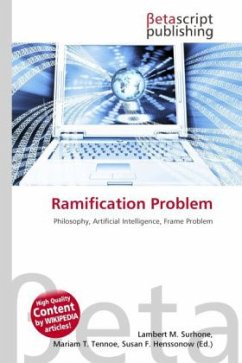High Quality Content by WIKIPEDIA articles! In philosophy and AI (especially, knowledge based systems), the ramification problem is concerned with indirect consequences of an action. It might be posed as how to represent what happens implicitly due to an action or to control secondary and tertiary effects within the same period. It is strongly connected to , and is opposite the qualification side of, the frame problem. In operational usage, limit theory helps. For instance, in KBE derivation of a populated design (geometrical objects, etc., similar concerns apply in shape theory), equivalence assumptions allow convergence where potentially large, and perhaps even computationally indeterminate, solution sets are handled deftly. Yet, in a chain of computation, downstream events may very well find some types of results from earlier resolutions of ramification as problematic for their own algorithms.
Bitte wählen Sie Ihr Anliegen aus.
Rechnungen
Retourenschein anfordern
Bestellstatus
Storno








